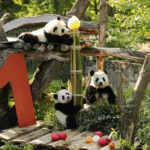Topic: Cultural and Tourism “Heat” Radiates, Consumption Scenes Renewed — 2025 Summer Consumption Review
The cultural and tourism market is radiating “heat,” with red tourism continuing to warm up, and popular IPs driving the “theme park economy” to sizzle. The summer season is blooming with diversity, as on-screen and off-screen interactions boost the quality and upgrade of cultural consumption. New business formats are unleashing vitality, with personalized scenes activating new consumption momentum…
This summer, the consumption market is thriving and active, with major scenic spots crowded with visitors and consumption scenes continuously renewed, reflecting the vitality of China’s economy.
Summer Electronics Spark a “Renewal Heat”
Since the start of summer, the potential of the “post-exam economy” has been unleashed, overlapping with the back-to-school buying热潮 in late August, driving sustained growth in consumption of electronics such as mobile phones, cameras, and computers.
“Taking advantage of national subsidies, I plan to upgrade to a higher-configuration laptop. With the store discounts, the price is very cost-effective,” said Liu Yining, a university student upgrading her “equipment” for the new semester at the Suning.com Max store in Nanjing’s Xinjiekou.
Feng Jin, Vice President of Suning.com’s Consumer Electronics Division, noted that since the start of summer, sales of various 3C digital products have grown rapidly. During the “818” promotion, sales of telephoto mobile phones, laptops, and tablets all increased by over 100% year-on-year.
Major e-commerce platforms have also launched summer-exclusive promotional activities — JD.com started the “3C Digital Summer Sale,” with some items discounted up to 60% off after trade-in subsidies; Pinduoduo’s “Back to School Renewal” event offered students additional discount coupons for stationery and digital products…
Amid the sales boom, more electronic consumer goods are upgrading towards intelligence and personalization.
At a shopping mall in Yangjiang, Guangdong, an artificial intelligence technology experience exhibition attracted large numbers of consumers to check in and experience. Staff from the organizer, iFlytek, said, “This summer, many parents and children have come to our stores and events to learn about AI-related products. Sales of AI learning devices during the summer have more than doubled compared to last year.”
“Current consumer demand is gradually shifting from ‘functional satisfaction’ to ‘experience upgrade.’ The deep integration of AI with electronic products is further activating consumption potential while continuously driving industrial upgrades towards smart manufacturing,” said Chen Lifen, a researcher at the Market Economy Research Institute of the State Council Development Research Center.
Red Tourism and “Theme Park Economy” Ignite Summer Cultural Tourism
In Shenyang, Liaoning, in front of the September 18th History Museum, a huge stone monument resembling an open calendar attracts visitors who linger for a long time.
On August 10, after renovation, the September 18th History Museum opened to citizens and tourists. On the first day of trial opening, over 40,000 people visited. Jiao Ke, a tourist from Hunan, said, “Gaining insight into the great spirit of the War of Resistance here makes my trip to Shenyang more meaningful.”
Coinciding with the 80th anniversary of the victory of the Chinese People’s War of Resistance Against Japan, red tourism further warmed up this summer. Data from Tongcheng Travel shows that since late July, the popularity of war-related memorial halls and historical sites has continued to rise.
On August 25, Shanghai Lego Park, which officially opened this summer, welcomed a peak in客流, with tickets sold out for the day. Entering the park, a 26-meter-tall giant Lego figure “Dada” comes into view, with various colorful amusement facilities creating a dreamy fairy-tale world.
This summer, the “Lego heat” and “Labubu heat” have driven the “theme park economy” to continue warming up. On the Qunar platform, bookings for theme parks increased by 70% year-on-year, with destinations like Shanghai Lego Park Resort and Guangzhou Chimelong Safari Park remaining highly popular.
At the same time, trends like “traveling for concerts” and “traveling for exhibitions” are strong. Data from Fliggy shows that during热门 cultural and sports events such as concerts in cities like Chengdu,





